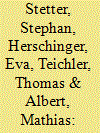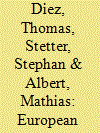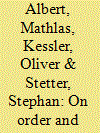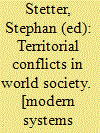|
|
|
Sort Order |
|
|
|
Items / Page
|
|
|
|
|
|
|
| Srl | Item |
| 1 |
ID:
110767


|
|
|
|
|
| Publication |
2011.
|
| Summary/Abstract |
In the current literature in International Relations and Conflict Studies, water as a source of conflict is either extremely over- or exceedingly underrated. In order to account for the dynamics of water conflicts, it is argued in this article that the study of water conflicts should be linked to comprehensive theories of social conflict and world society. A theoretical framework is developed based on a combination of securitization theory, modern systems theory and sociological neo-institutionalism. The usefulness of this framework is illustrated through two empirical cases of water conflicts, namely Spain and Egypt/Sudan. This study contributes to an understanding of the evolution of water conflicts as a result of securitization practices, the dynamics of these conflicts as complex social systems and as the outcome of local adaptations to and of 'world cultural' frames.
|
|
|
|
|
|
|
|
|
|
|
|
|
|
|
|
| 2 |
ID:
073976


|
|
|
|
|
| Publication |
2006.
|
| Summary/Abstract |
Our article analyzes the impact of the European Union (EU) on border conflicts, in particular how integration and association are related to conflict transformation. We approach this issue from a theoretically as well as empirically grounded constructivist perspective. On this basis we propose a stage model of conflict development, based on the degree of securitization and societal reach of conflict communication. We argue that the EU can transform border conflicts and propose a four pathway-model of EU impact. This model comprises forms of EU impact that are, on the one hand, either actor-driven or indirectly caused by the integration process and have, on the other hand, as their main target either particular policies or the wider society in border conflict areas. We then apply this model to a comparative study of border conflicts, thereby analyzing the conflicts in Northern Ireland, Greece-Turkey, Cyprus, Europe's North (EU-Russia) and Israel-Palestine. We finish with a specification of the conditions of positive and negative EU impact.
|
|
|
|
|
|
|
|
|
|
|
|
|
|
|
|
| 3 |
ID:
081208


|
|
|
|
|
| Publication |
2008.
|
| Summary/Abstract |
This article begins from the observation that while communication is a widely used catch-phrase in current IR theorising, the very concept of 'communication' is still mainly treated in terms of simple sender-receiver models which do not sufficiently elaborate how the insights of the 'communicative turn' can be made fruitful for IR theorising. The argument is developed in three steps. First - particularly drawing on the work of Karl W. Deutsch - we identify those pockets in IR theory, namely conflict studies and theories of 'communicative action', in which 'communication' plays a considerable theoretical role. Second, it is claimed that placing 'communication' at the centre of any theory of IR requires taking full account of the theoretical consequences of the 'linguistic turn'. To develop this argument requires an examination of the often implicit notion of 'communication' in contemporary uses of speech act theory and symbolic interactionism in current IR theory. Such a move necessarily leads to the diagnosis that all social systems and orders of exchange, including international relations, are communicatively constituted. Finally, such a view enables a reconfiguration of the central problems of 'order' and 'conflict' in IR theory in an innovative fashion: while the problem of order can be restated not as the problem of establishing regularities and patterns but as a problem of disconnecting communications, the problem of conflict can be restated not as a problem of a disruption of communication but as a problem of continuing conflict communication.
|
|
|
|
|
|
|
|
|
|
|
|
|
|
|
|
| 4 |
ID:
079269


|
|
|
|
|
| Publication |
London, Routledge, 2007.
|
| Description |
xiv, 238p.
|
| Standard Number |
9780415416740
|
|
|
|
|
|
|
|
|
|
|
|
Copies: C:1/I:0,R:0,Q:0
Circulation
| Accession# | Call# | Current Location | Status | Policy | Location |
| 052743 | 327.117/STE 052743 | Main | On Shelf | General | |
|
|
|
|
|
|
|
|
|